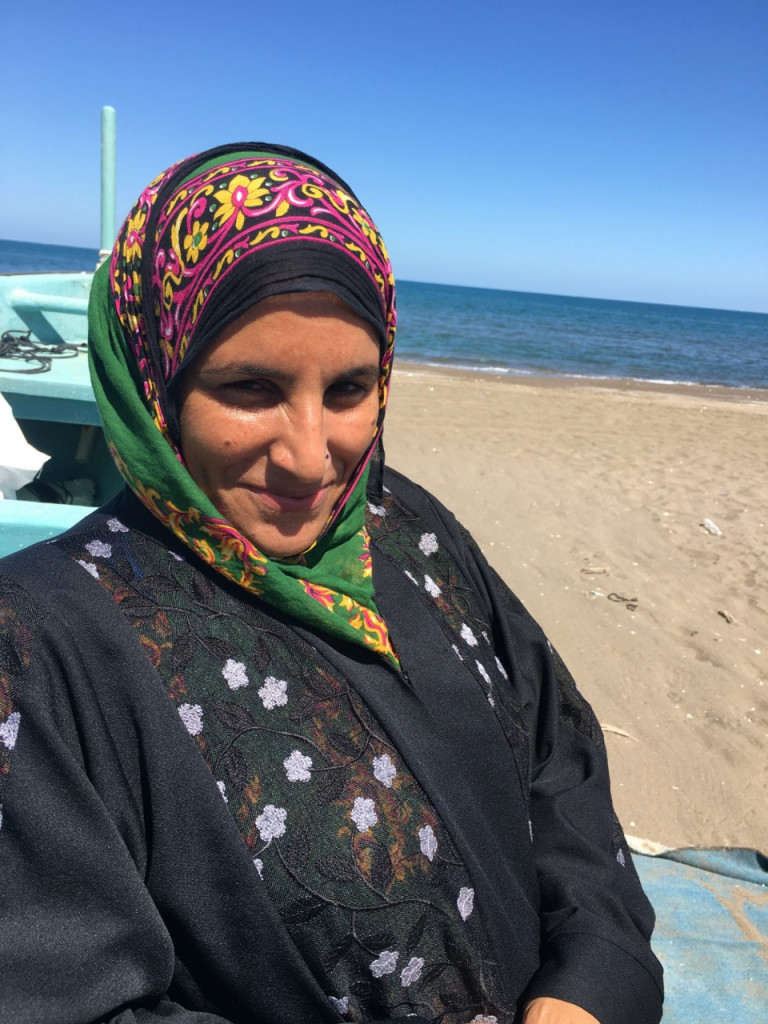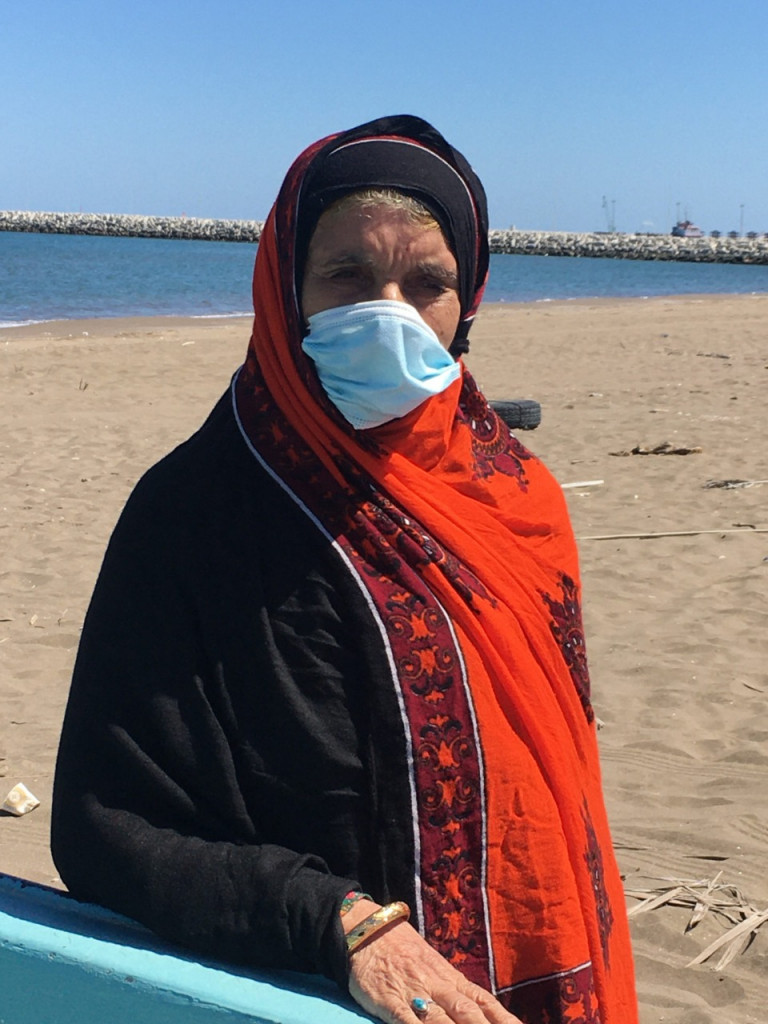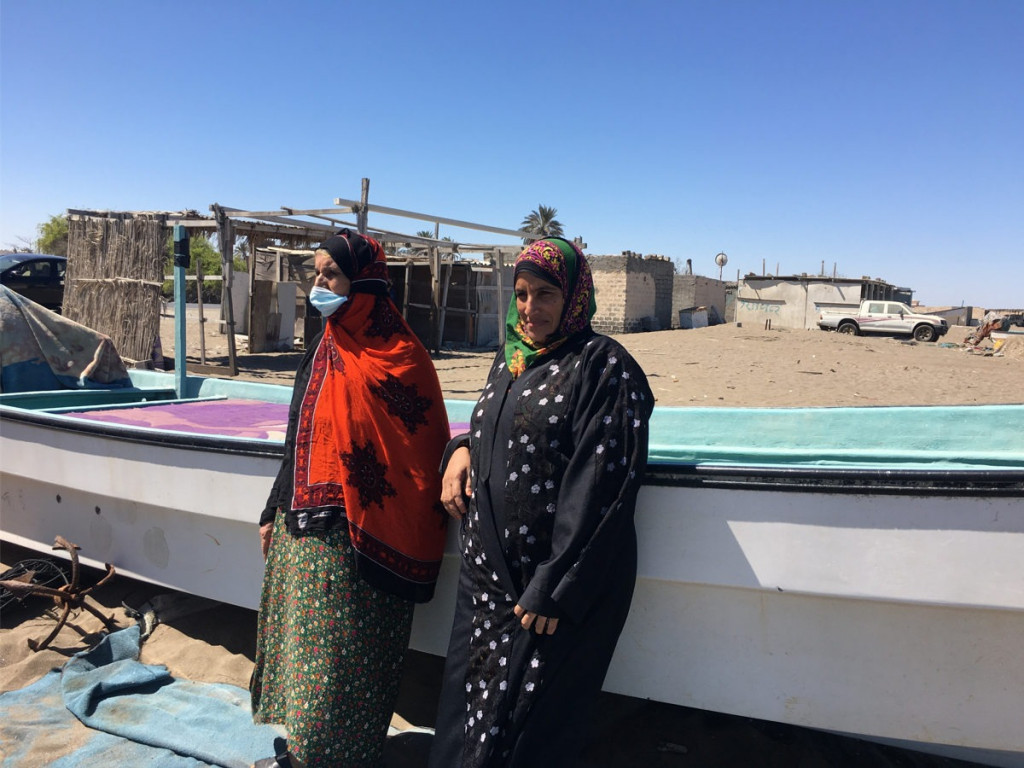
Salima bint Khalifa Abdullah Al Salhi
Ask Salima bint Khalifa Abdullah Al Salhi what makes her happy and she quietly replies: a boat full of fresh fish from the sea!
“It always feels like a treasure – like an open chest with the world’s costliest jewels shining there – that is how it always felt for me and that is how it feels, even today,” says a proud Salima bint Khalifa Abdullah Al Salhi to thePurple, as her mother, Sheikha Hashil Al Salhi, nods approvingly.
Fishing is our life“I have always felt like this – elated and almost ecstatic when I used to see my father bring to the shore a load of catch in his boat. He would take an empty boat to the sea in the early evening, and after six hours or so, close to midnight, my father would be back, his boat rippling with fish.“All of us used to feel so happy – it was like our hearts went along with my father on his empty boat and when he returned with a fresh catch, his boat full, our hearts would also be filled – with happiness.“It is something most fisher folk will understand. Ours is not a job or a profession, it is our passion, it is our life, it is our identity – it is what we are!” Salima Al Salhi went on, her shyness forgotten and we could feel her passion filling the space.
Fishing is their livelihoodSalima, who is yet to marry, lives with her mother and family members in the Hallit Al Husn area of Musannah. For most of those who live in this area, fishing is their livelihood and primary source of income and therefore an indispensable part of their life.“Most of the families are into fishing and I am no different. Women in the family help the men folk and they are not averse to taking up other functions of the fishing business too. As for me, I began by assisting my father and brothers in all aspects of fishing. And soon it became as much as a part of me as it was theirs. The selling is not the crucial part – other things are involved like sorting out the fish, separating them from the net and helping the family set it up for sale,” Salima noted.Naturally grew into the world of fishing
Since the time she was eight, or perhaps, even younger, Salima grew up watching her father, Khalifa Al Salhi, push his empty boat off to the seas and coming back with a full load. “For me, the catch was always an impressive sight! It was like a bounty for me and I naturally grew into this fishing job, and helping my father was a delight. I felt very proud that I could be a part of my father’s work.
Never returned empty handed“And everyone in the family, including my mother, worked hard. In the early days, my job was to help my father sort out the fish and remove them from the nets.“My father was quite well known in the fishing circles. He was never known to return empty handed. My father and my brothers would head off to the seas by 5pm and then return by 11pm.
So, right from childhood, after school, helping my father was part of my daily chores. Slowly, I picked it up and soon it became a second habit to me. Once I grew up, I was helping my brothers in an equivalent capacity.
My father used to take me to the seas too and so I became adept at every aspect of fishing.” From the time Salima’s father passed away, some 14 years ago, she was the backbone of support for her sea-faring brothers.
Sold at various point of sales
Salima noted that Musannah had a variety of fish, a feature common to any other part of the country. “My brothers had a daily schedule and a staple network of buyers and dealers. We had our boats and nets and we fished every day. The catch was sold in the early mornings at various points of sale, including the government-owned fish market stalls as well as street corners near the beaches.”
Strenuous work
Most of the families who lived in the coastal areas depended on fishing as their sole source of livelihood. “But, not many women were into direct fishing or selling on a fulltime basis,” Salima said, adding that every aspect of the work involved good physical effort and some parts of it was strenuous.
Encouraged by her father
“However, since my father always encouraged me and I also saw my mother doing almost all of the chores, I did not feel any different when my turn came. I guess I was a natural at it. I also learned how to make fishing nets and also repair them if necessary.”
Glut in the catch
Most laymen equate fishing with the selling of fish in the market. But that is almost at the last stage. “Fishing is not about selling of fish, it is more about going to the sea to catch fish, and then handling the process of sorting out, storing, transporting the fish,” Salima explained. “During the winter season, there is a glut in the catch, and sometimes, we are gifted with a stroke of luck where we land up with phenomenal numbers,” Salima said, adding that while the trade was profitable, the effort and the work that went behind it was huge. “At times, it could get quite hectic and we would not have a moment to spare. After my father passed away, my four brothers took over. Since I knew all aspects of the job, I proved to be an able assistant and supported them in every way. I worked with them for many years. Today, they handle it independently. If required, I go and assist them.”
Sisters-in-law are good support
“I am very happy that all four of my brothers are well settled and they handle the fishing business independently now. I have stopped the daily work and be with them only when needed. And like in most business, the women members of the family support the males. And in our case, my brothers’ wives have all proven to be good support,” Salima said, heaping praise on her sisters-in-law.

Fishing is life – and life, fishing
Fishing, she reiterated, was not just a job or a trade, or even just a passion. “It is beyond all that. It is life – our life. So, it actually encompasses all that and goes beyond the mere fact of being a business that brings in money.For those of us who have lived off the coast, and that too belonging to fishing families that have been doing this for generations, this is the only life that we have known. We live fishing and we die fishing. Everything revolves around fishing,” Salima said passionately.
Times have changed
However, times have changed, today, Salima’s brothers communicate through latest technology and even via Instagram etc. “We still deal with direct fishing and selling. However, we don’t process any fish.”
Fishing is team work
“My father had wooden boats and simple, uncomplicated nets. For a fishing family, these two aspects are like an extension of their being and part of their daily lifestyle. “Every member of the family automatically learnt the job, or they were thorough with some parts of fishing. Most important aspect of all this is that fishing itself is a group trade. It is not a trade that can be taken up by a single person. “And for me that is an added value — the interdependency and unity in the trade that makes it dearer to me. “As I have always stated, I used to glow with pride when my father brought his boat back to shore loaded with fish.“We all felt happy seeing the load and it also brought us all together.”
Why don’t women go out to sea?
Why is that the women in fishing communities mostly do the shore work than ride the waves and go fishing? Does she feel that that fishing (in the seas) is a man’s job? Were there any superstitions associated with fishing?“Yes it is true, not many womenfolk go out to the sea. I was lucky because my father encouraged me and I used to go with my father when I was a small girl itself.As for women not going on the boat…I don’t think there is any superstition attached to it – just practicality. Most women take care of their homes, children, their men, cooking and other related chores. Fishing takes place mostly during early mornings or late evenings, which becomes a heavy toll on a woman’s family time.
Moreover, we cannot rule out the physical aspect of it. A lot of physical effort is required when you get into a boat and go fishing into the sea,” Salima said.
Love it – then is it not work
“However, as a girl or as a young woman I never felt over burdened. I guess I was natural at it and like any work, if you really love doing it, you don’t feel like it is work,” Salima added.
Not a single man’s job
Musannah does not seem to harbour many fishing tales about women or their exploits. And you don’t give a second glance, if you happen to see women in Musannah assisting their family in any aspects of fishing, either in the boat, nets or sales, for it is indeed a tradition in many of the families there. “It is true that fishing is not seen as a common career or job choice for women. But then, I would like to reiterate that fishing is not a single man’s job too – it has to be with a group; a team is required. And sometimes, in a team, having a woman or two is nothing unusual.”

Almost magical
Born into a fishing family and seeing her father do it every day, for Salima it is a different story altogether. For her, not only is the sea captivating, the sheer thrill of fishing and wielding a boat and a net like a professional, racing into the sea empty and returning with a full load is almost magical.
A woman can do any job
“Like my mother, I also believe that a woman can do just about anything. Why should she be different than a man? Put her in a job she likes and you will find her to be a winner there. There is no job she cannot learn or perform. Generally, I believe that most families are very protective of their women and hence the men ensure that they handle all the work that requires real physical work and effort. But, in today’s world, whatever the work, women stand shoulder to shoulder with men.”
“Women can not only do anything, she is used to doing the toughest task in the world: giving birth”
Sheikha Hashil Al Salhi, mother of Salima Al Salhi (as told to the Purple).
“My daughter may be a bit shy, but she is a very strong woman. Even as a girl, she was quite tough. Maybe it was because she grew up with her brothers and her father treated her as an equal.“My girl worked like a man – going fishing on the boat, sorting fish, making nets, repairing them, selling fish – she did everything.“I think she took to fishing like a duck to water. “And I feel that there is no job that a woman cannot do. Nothing. She can do anything she wants if she sets her mind to it.
And the woman, by her very nature, is entrusted with the toughest task in the world – to give birth to a child.
“A woman is never scared, weak or meek. She may be shy, like my Salima, but always strong and protective!”

0 Comments